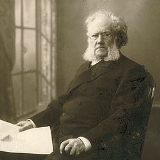
in the theatre. His major works include Brand
, Peer Gynt
, An Enemy of the People
, Emperor and Galilean
, A Doll's House
, Hedda Gabler
, Ghosts
, The Wild Duck
, and Rosmersholm
.
Several of his plays were considered scandalous to many of his era, when European theater was required to model strict mores of family life and propriety.
Erring soul of man — if thou wast indeed forced to err, it shall surely be accounted to thee for good on that great day when the Mighty One shall descend in the clouds to judge the living dead and the dead who are yet alive!![]()
The great secret of power is never to will to do more than you can accomplish. The great secret of action and victory is to be capable of living your life without ideals. Such is the sum of the whole world's wisdom.![]()
I hold that man is in the right who is most closely in league with the future.![]()
The great task of our time is to blow up all existing institutions — to destroy.![]()
Tvertimot!![]()
I thank God that in the bath of Pain He purged my love. What strong compulsion drew Me on I knew not, till I saw in you The treasure I had blindly sought in vain. I praise Him, who our love has lifted thus To noble rank by sorrow, — licensed us To a triumphal progress, bade us sweep Thro' fen and forest to our castle-keep, A noble pair, astride on Pegasus|Pegasus!![]()

